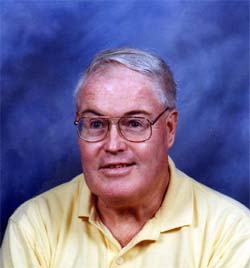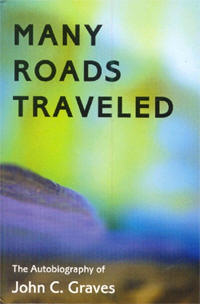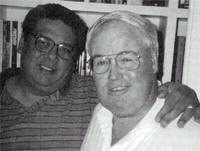
|
I first met John Cowperthwaite Graves shortly after he moved to Fort Lauderdale in 1990. As a scholar and a book lover, Graves was naturally drawn to the Stonewall Library and Archives (SLA), which I was greatly involved with at the time and which was then housed at the Sunshine Cathedral Metropolitan Community Church.
In his autobiography, Many Roads Traveled (2000), John C. Graves wrote about his eventful life. The child of two socially-prominent families - the Cowperthwaites and the Graves - he was born in New York City on May 16, 1938. He studied at Princeton, where he received his doctorate, and taught Philosophy at the Massachusetts Institute of Technology from 1964 to 1974. Dr. Graves's lectures were lively affairs, featuring instructive stories, lively anecdotes, and even a song or two. Later, in his "retirement", he would at times lecture at the Sunshine Cathedral; and his lectures on early Christian history were so interesting that even non-Christians attended. Graves found time amidst his busy academic career to become both a skilled tennis player and a talented opera singer. While still at MIT (1972), Dr. Graves came out as a gay man and became an active part of Boston's dynamic LesBiGay community. He helped found (1974) the Gay Academic Union of New England and the Boston Center for Lesbians and Gay Men and sang at the Boston Gay Men's Chorus. Though a sizable inheritance allowed Graves to retire as an academic, he continued his career of service as a psychotherapist at the Homophile Community Health Service in Boston. Like other retirees, Dr. Graves moved to South Florida in 1990, though he continued to spend his summers in Provincetown. But John Graves was no gentleman of leisure. Unlike other affluent South Florida retirees, he did not spend his time on cruise ships or at the beach. Rather, he became a major player in Fort Lauderdale's flourishing gay scene. He served as president of several organizations, including Gays United to Attack Repression and Discrimination (GUARD).
Before long, Graves's generosity as a philanthropist became well-known; and not just in the GLBT community. In 2001, the Association of Fundraising Professionals honored him as that year's Outstanding Philanthropist, the first openly gay man to win such an honor. Other beneficiaries of John Graves's largesse included the Institute of Gay and Lesbian Strategic Studies in Massachusetts, the Massachusetts Institute of Technology (MIT) and the Boston Concert Opera. Just before his death, the Gay and Lesbian Foundation of South Florida announced that it was giving him its prestigious Humanitarian Award. John C. Graves was a true Renaissance man. He wrote several books: including The Conceptual Foundations of Contemporary Relativity Theory (1971), his doctoral dissertation; Undergraduate Housing in the 1970s, an MIT report (1972); and his autobiography. He enjoyed a close and loving relationship with his life partner, Raymond Trevino. He hosted fabulous winter parties in Fort Lauderdale and summer parties in Provincetown. His winter parties, which Michael and I had the privilege to attend every year, brought together a "who's who" of South Florida gay society, from politicians and business leaders to active members of the SLA, MCC and other organizations. Though Graves enjoyed his life to the fullest, he lived simply and did not flaunt his wealth, except of course, through his generosity.
Paul Harris, writer and journalist, remembers Dr. Graves as "an unlikely gay militant and activist" whose "commitment to our cause was undeniable." Though "many gay men and lesbians with his material assets have been content to do little for the cause of their fellows, he on the other hand was always unfailingly generous and truly both believed and acted as if he were the steward of his wealth rather than its owner, and that wealth, while offering advantages also conferred responsibilities." Tony Ramos, former President of GUARD and current Co-Chair of Pride of Greater Fort Lauderdale, notes that "John Graves has devoted himself over many years to not only better our community, but to preserve our history as well. His legacy will live on in our lives and into the lives of the next GLBT generation." I for one will always remember John C. Graves as a kind and loving man, with a great sense of humor and a lifetime devotion to his fellow humans. Though an apparent embolism took him away from us on October 13, 2003, in a sense he will always be with us. John Graves lives on in the Stonewall Library and Archives, in the Sunshine Cathedral, and in the memories of his many friends and of a grateful community. Jesse Monteagudo is a South Florida writer and activist who is privileged to have known John Graves. His e-mail address is jessemonteagudo@aol.com . |
|
 John C. Graves is remembered for his philanthropy in South Florida
John C. Graves is remembered for his philanthropy in South Florida  Many Roads Traveled is the autobiography of John C. Graves
Many Roads Traveled is the autobiography of John C. Graves  John C. Graves (right), here with his partner Raymond Trevino, leaves behind a legacy in South Florida
John C. Graves (right), here with his partner Raymond Trevino, leaves behind a legacy in South Florida